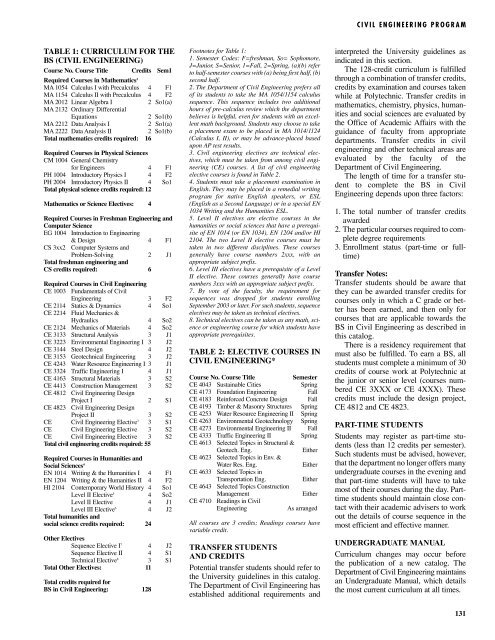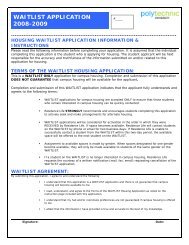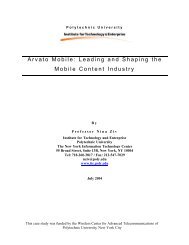POLYTECHNIC UNIVERSITY 2005-2007
POLYTECHNIC UNIVERSITY 2005-2007
POLYTECHNIC UNIVERSITY 2005-2007
You also want an ePaper? Increase the reach of your titles
YUMPU automatically turns print PDFs into web optimized ePapers that Google loves.
CIVIL ENGINEERING PROGRAM<br />
TABLE 1: CURRICULUM FOR THE<br />
BS (CIVIL ENGINEERING)<br />
Course No. Course Title Credits Sem1<br />
Required Courses in Mathematics 2<br />
MA 1054 Calculus I with Precalculus 4 F1<br />
MA 1154 Calculus II with Precalculus 4 F2<br />
MA 2012 Linear Algebra I<br />
2 So1(a)<br />
MA 2132 Ordinary Differential<br />
Equations<br />
2 So1(b)<br />
MA 2212 Data Analysis I<br />
2 So1(a)<br />
MA 2222 Data Analysis II<br />
2 So1(b)<br />
Total mathematics credits required: 16<br />
Required Courses in Physical Sciences<br />
CM 1004 General Chemistry<br />
for Engineers 4 F1<br />
PH 1004 Introductory Physics I 4 F2<br />
PH 2004 Introductory Physics II 4 So1<br />
Total physical science credits required: 12<br />
Mathematics or Science Electives: 4<br />
Required Courses in Freshman Engineering and<br />
Computer Science<br />
EG 1004 Introduction to Engineering<br />
& Design 4 F1<br />
CS 3xx2 Computer Systems and<br />
Problem-Solving 2 J1<br />
Total freshman engineering and<br />
CS credits required: 6<br />
Required Courses in Civil Engineering<br />
CE 1003 Fundamentals of Civil<br />
Engineering 3 F2<br />
CE 2114 Statics & Dynamics 4 So1<br />
CE 2214 Fluid Mechanics &<br />
Hydraulics 4 So2<br />
CE 2124 Mechanics of Materials 4 So2<br />
CE 3133 Structural Analysis 3 J1<br />
CE 3223 Environmental Engineering I 3 J2<br />
CE 3144 Steel Design 4 J2<br />
CE 3153 Geotechnical Engineering 3 J2<br />
CE 4243 Water Resource Engineering I 3 J1<br />
CE 3324 Traffic Engineering I 4 J1<br />
CE 4163 Structural Materials 3 S2<br />
CE 4413 Construction Management 3 S2<br />
CE 4812 Civil Engineering Design<br />
CE 4823<br />
Project I 2 S1<br />
Civil Engineering Design<br />
Project II 3 S2<br />
CE Civil Engineering Elective 3 3 S1<br />
CE Civil Engineering Elective 3 S2<br />
CE Civil Engineering Elective 3 S2<br />
Total civil engineering credits required: 55<br />
Required Courses in Humanities and<br />
Social Sciences 4<br />
EN 1014 Writing & the Humanities I 4 F1<br />
EN 1204 Writing & the Humanities II 4 F2<br />
HI 2104 Contemporary World History 4 So1<br />
Level II Elective 5 4 So2<br />
Level II Elective 4 J1<br />
Level III Elective 6 4 J2<br />
Total humanities and<br />
social science credits required: 24<br />
Other Electives<br />
Sequence Elective I 7 4 J2<br />
Sequence Elective II 4 S1<br />
Technical Elective 8 3 S1<br />
Total Other Electives: 11<br />
Total credits required for<br />
BS in Civil Engineering: 128<br />
Footnotes for Table 1:<br />
1. Semester Codes: F=freshman, So= Sophomore,<br />
J=Junior, S=Senior, 1=Fall, 2=Spring, (a)(b) refer<br />
to half-semester courses with (a) being first half, (b)<br />
second half.<br />
2. The Department of Civil Engineering prefers all<br />
of its students to take the MA 1054/1154 calculus<br />
sequence. This sequence includes two additional<br />
hours of pre-calculus review which the department<br />
believes is helpful, even for students with an excellent<br />
math background. Students may choose to take<br />
a placement exam to be placed in MA 1014/1124<br />
(Calculus I, II), or may be advance-placed based<br />
upon AP test results.<br />
3. Civil engineering electives are technical electives,<br />
which must be taken from among civil engineering<br />
(CE) courses. A list of civil engineering<br />
elective courses is found in Table 2.<br />
4. Students must take a placement examination in<br />
English. They may be placed in a remedial writing<br />
program for native English speakers, or ESL<br />
(English as a Second Language) or in a special EN<br />
1034 Writing and the Humanities ESL.<br />
5. Level II electives are elective courses in the<br />
humanities or social sciences that have a prerequisite<br />
of EN 1014 (or EN 1034), EN 1204 and/or HI<br />
2104. The two Level II elective courses must be<br />
taken in two different disciplines. These courses<br />
generally have course numbers 2xxx, with an<br />
appropriate subject prefix.<br />
6. Level III electives have a prerequisite of a Level<br />
II elective. These courses generally have course<br />
numbers 3xxx with an appropriate subject prefix.<br />
7. By vote of the faculty, the requirement for<br />
sequences was dropped for students enrolling<br />
September 2003 or later. For such students, sequence<br />
electives may be taken as technical electives.<br />
8. Technical electives can be taken as any math, science<br />
or engineering course for which students have<br />
appropriate prerequisites.<br />
TABLE 2: ELECTIVE COURSES IN<br />
CIVIL ENGINEERING*<br />
Course No. Course Title<br />
Semester<br />
CE 4043 Sustainable Cities Spring<br />
CE 4173 Foundation Engineering Fall<br />
CE 4183 Reinforced Concrete Design Fall<br />
CE 4193 Timber & Masonry Structures Spring<br />
CE 4253 Water Resource Engineering II Spring<br />
CE 4263 Environmental Geotechnology Spring<br />
CE 4273 Environmental Engineering II Fall<br />
CE 4333 Traffic Engineering II Spring<br />
CE 4613 Selected Topics in Structural &<br />
Geotech. Eng.<br />
Either<br />
CE 4623 Selected Topics in Env. &<br />
Water Res. Eng.<br />
Either<br />
CE 4633 Selected Topics in<br />
Transportation Eng.<br />
Either<br />
CE 4643 Selected Topics Construction<br />
Management<br />
Either<br />
CE 4710 Readings in Civil<br />
Engineering<br />
As arranged<br />
All courses are 3 credits; Readings courses have<br />
variable credit.<br />
TRANSFER STUDENTS<br />
AND CREDITS<br />
Potential transfer students should refer to<br />
the University guidelines in this catalog.<br />
The Department of Civil Engineering has<br />
established additional requirements and<br />
interpreted the University guidelines as<br />
indicated in this section.<br />
The 128-credit curriculum is fulfilled<br />
through a combination of transfer credits,<br />
credits by examination and courses taken<br />
while at Polytechnic. Transfer credits in<br />
mathematics, chemistry, physics, humanities<br />
and social sciences are evaluated by<br />
the Office of Academic Affairs with the<br />
guidance of faculty from appropriate<br />
departments. Transfer credits in civil<br />
engineering and other technical areas are<br />
evaluated by the faculty of the<br />
Department of Civil Engineering.<br />
The length of time for a transfer student<br />
to complete the BS in Civil<br />
Engineering depends upon three factors:<br />
1. The total number of transfer credits<br />
awarded<br />
2. The particular courses required to complete<br />
degree requirements<br />
3. Enrollment status (part-time or fulltime)<br />
Transfer Notes:<br />
Transfer students should be aware that<br />
they can be awarded transfer credits for<br />
courses only in which a C grade or better<br />
has been earned, and then only for<br />
courses that are applicable towards the<br />
BS in Civil Engineering as described in<br />
this catalog.<br />
There is a residency requirement that<br />
must also be fulfilled. To earn a BS, all<br />
students must complete a minimum of 30<br />
credits of course work at Polytechnic at<br />
the junior or senior level (courses numbered<br />
CE 3XXX or CE 4XXX). These<br />
credits must include the design project,<br />
CE 4812 and CE 4823.<br />
PART-TIME STUDENTS<br />
Students may register as part-time students<br />
(less than 12 credits per semester).<br />
Such students must be advised, however,<br />
that the department no longer offers many<br />
undergraduate courses in the evening and<br />
that part-time students will have to take<br />
most of their courses during the day. Parttime<br />
students should maintain close contact<br />
with their academic advisers to work<br />
out the details of course sequence in the<br />
most efficient and effective manner.<br />
UNDERGRADUATE MANUAL<br />
Curriculum changes may occur before<br />
the publication of a new catalog. The<br />
Department of Civil Engineering maintains<br />
an Undergraduate Manual, which details<br />
the most current curriculum at all times.<br />
131




